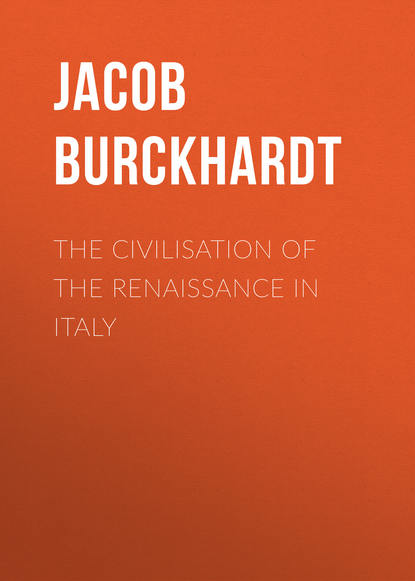По всем вопросам обращайтесь на: info@litportal.ru
(©) 2003-2024.
✖
The Civilisation of the Renaissance in Italy
Настройки чтения
Размер шрифта
Высота строк
Поля
1225
He calls him later on: ‘Medicus Ducis Saxoniæ, homo tum dives tum potens.’
1226
In the fourteenth century there existed a kind of hell-gate near Ansedonia in Tuscany. It was a cave, with footprints of men and animals in the sand, which whenever they were effaced, reappeared the next day. Uberti. Il Dittamondo, l. iii. cap. 9.
1227
Pii II. Comment. l. i. p. 10.
1228
Benv. Cellini, l. i. cap. 65.
1229
L’Italia Liberata da’ Goti, canto xiv. It may be questioned whether Trissino himself believed in the possibility of his description, or whether he was not rather romancing. The same doubt is permissible in the case of his probable model, Lucan (book vi.), who represents the Thessalian witch conjuring up a corpse before Sextus Pompejus.
1230
Septimo Decretal, lib. v. tit. xii. It begins: ‘Summis desiderantes affectibus’ &c. I may here remark that a full consideration of the subject has convinced me that there are in this case no grounds for believing in a survival of pagan beliefs. To satisfy ourselves that the imagination of the mendicant friars is solely responsible for this delusion, we have only to study, in the Memoirs of Jacques du Clerc, the so-called trial of the Waldenses of Arras in the year 1459. A century’s prosecutions and persecutions brought the popular imagination into such a state that witchcraft was accepted as a matter of course and reproduced itself naturally.
1231
Of Alexander VI., Leo X., Hadrian VI.
1232
Proverbial as the country of witches, e.g. Orlandino, i. 12.
1233
E.g. Bandello, iii. nov. 29, 52. Prato, Arch. Stor. iii. 409. Bursellis, Ann. Bon. in Murat. xxiii. col. 897, mentions the condemnation of a prior in 1468, who kept a ghostly brothel: ‘cives Bononienses coire faciebat cum dæmonibus in specie puellarum.’ He offered sacrifices to the dæmons. See for a parallel case, Procop. Hist. Arcana, c. 12, where a real brothel is frequented by a dæmon, who turns the other visitors out of doors. The Galateo (p. 116 (#x7_x_7_i4)) confirms the existence of the belief in witches: ‘volare per longinquas regiones, choreas per paludes dicere et dæmonibus cnogredi, ingredi et egredi per clausa ostia et foramina.’
1234
For the loathsome apparatus of the witches’ kitchens, see Maccaroneide, Phant. xvi. xxi., where the whole procedure is described.
1235
In the Ragionamento del Zoppino. He is of opinion that the courtesans learn their arts from certain Jewish women, who are in possession of ‘malie.’ The following passage is very remarkable. Bembo says in the life of Guidobaldo (Opera, i. 614): ‘Guid. constat sive corporis et naturae vitio, seu quod vulgo creditum est, actibus magicis ab Octaviano patruo propter regni cupiditatem impeditum, quarum omnino ille artium expeditissimus habebatur, nulla cum femina coire unquam in tota vita potuisse, nec unquam fuisse ad rem uxoriam idoneum.’
1236
Varchi, Stor. Fior. ii. p. 153.
1237
Curious information is given by Landi, in the Commentario, fol. 36 a and 37 a, about two magicians, a Sicilian and a Jew; we read of magical mirrors, of a death’s-head speaking, and of birds stopped short in their flight.
1238
Stress is laid on this reservation. Corn. Agrippa, De Occulta Philosophia, cap. 39.
1239
Septimo Decretal, l. c.
1240
Zodiacus Vitae, xv. 363-549, comp. x. 393 sqq.
1241
Ibid. ix. 291 sqq.
1242
Ibid. x. 770 sqq.
1243
The mythical type of the magician among the poets of the time was Malagigi. Speaking of him, Pulci (Morgante, canto xxiv. 106 sqq.) gives his theoretical view of the limits of dæmonic and magic influence. It is hard to say how far he was in earnest. Comp. canto xxi.
1244
Polydorus Virgilius was an Italian by birth, but his work De Prodigiis treats chiefly of superstition in England, where his life was passed. Speaking of the prescience of the dæmons, he makes a curious reference to the sack of Rome in 1527.
1245
Yet murder is hardly ever the end, and never, perhaps, the means. A monster like Gilles de Retz (about 1440) who sacrificed more than 100 children to the dæmons has scarcely a distant counterpart in Italy.
1246
See the treatise of Roth ‘Ueber den Zauberer Virgilius’ in Pfeiffer’s Germania, iv., and Comparetti’s Virgil in the Middle Ages. That Virgil began to take the place of the older Telestæ may be explained partly by the fact that the frequent visits made to his grave even in the time of the Empire struck the popular imagination.
1247
Uberti, Dittamondo, 1. iii. cap. 4.
1248
For what follows, see Gio. Villani, i. 42, 60, ii. 1, iii. v. 38, xi. He himself does not believe such godless superstitions. Comp. Dante, Inferno xiii. 146.
1249
According to a fragment given in Baluz. Miscell ix. 119, the Perugians had a quarrel in ancient times with the Ravennates, ‘et militem marmoreum qui juxta Ravennam se continue volvebat ad solem usurpaverunt et ad eorum civitatem virtuosissime transtulerunt.’





